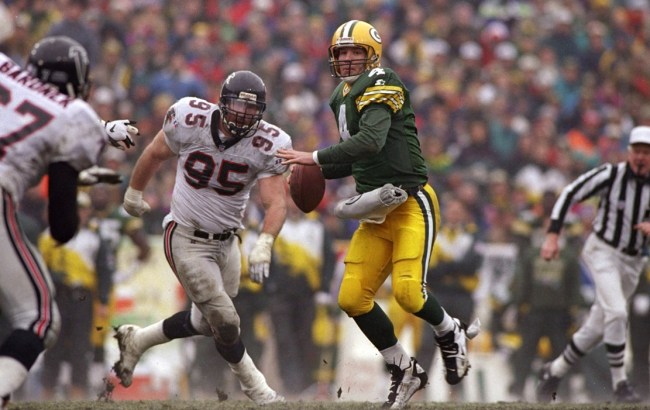
Getty Image
During the 1995 NFL season, Green Bay Packers quarterback Brett Favre led the NFL in yards passing with 4,413 as well as in touchdown passes with 38. He also won the first of three consecutive NFL MVP awards that year. He was also addicted to Vicodin that year, spending 72 days in a rehab clinic in Kansas City in an attempt to break the addiction.
In Peter King’s final edition of his well-read “Monday Morning Quarterback” column for Sports Illustrated, King revisited that time period with the man himself, Brett Favre, revealed several very interesting revelations.
King wrote about the time he spent three nights in one week at Favre’s home in 1995 and how when he would visit late at night, tired from a long day, Favre was still chock full of energy.
“Oh, I remember that week,” Favre said over the phone. “You thought, ‘Man, this guys’s high on life.’ You didn’t know there was a reason for it. It is really amazing, as I think back, how well I played that year. That was an MVP year for me. But that year, when I woke up in the morning, my first thought was, ‘I gotta get more pills.’ I took 14 Vicodin, yes, one time. I was getting an hour or two of sleep many nights. Maybe 30 minutes of quality sleep. I was the MVP on a pain-pill buzz. The crazy thing was, I’m not a night owl. Without pills I’d fall asleep at 9:30. But with pills, I could get so much done, I just figured, ‘This is awesome.’ Little did I know [fiancée and now wife] Deanna would be finding some of my pills and when she did, she’d flush them down the toilet.
“I actually went to rehab three times. I saw the most successful, smart people — doctors, professional people — lose it all, ruin their lives. A year or two before you saw me, I went to a place in Rayville, La., just outside Monroe. It was pills then too. Deanna and [agent] Bus [Cook] talked me into it. I didn’t think I had a problem, but they talked me into it. I went for 28 days. When I got out, I was able to control myself for a while. I wouldn’t take anything for a day or two, and I wouldn’t drink. But I was a binge drinker. When I drank, I drank to excess. So when I went in the second time, to the place in Kansas, I remember vividly fighting them in there. They said drinking was the gateway drug for me, and they were right, absolutely right, but I wouldn’t admit it. I will never forget one of the nurses. I had it all figured out. I fought with this nurse all the time. I would not admit the drinking problem. At the end she said to me, ‘You’ll be back.’
“I was back. 1998. Guess who was waiting there when I walked in — that same nurse. This time it was strictly for drinking. I didn’t go back to the pills. I admitted my problem, I was in there 28 days, and it worked. When I got out, the toughest thing was the first three months, because I had to change my thought process. When I played golf before, I realized the only reason I wanted to play was to drink. After a while, instead of thinking, ‘How many beers can we drink in 18 holes?’ I fell into a pattern of what could I do to get good at golf. I realized with each passing day I really didn’t like drinking.”
Favre is right. It is amazing that during arguably the three best years of his Hall of Fame career, during which he also won a Super Bowl, Favre was treating his already battered body so poorly.
Read Peter King’s entire final “MMQB” column here.